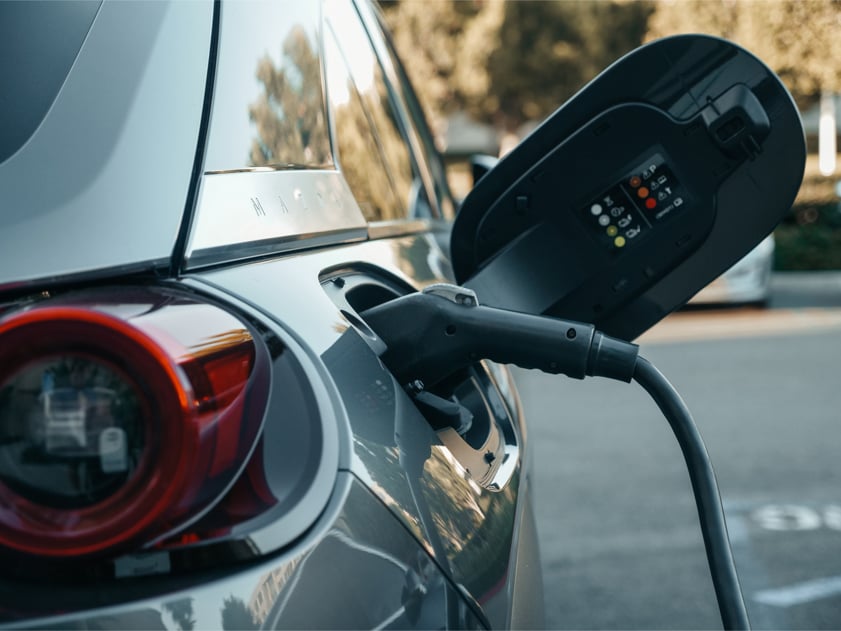
Trying to understand the terminology of charging speeds, with its references to kilowatt hours and AC/DC currents, can seem overwhelming, yet knowing these details isn't strictly necessary. The key information you require is the capacity of your battery and the output power of a charging station. With these figures, calculating the time needed to fully charge your vehicle becomes straightforward.
Therefore, the question arises: which charging station should you choose? Our straightforward blog below will help you decide the appropriate option for your needs and the right time to use it.
Charging speed refers to the duration required to replenish the battery of your electric vehicle (EV). The charging process is influenced by the battery's capacity and the charging station's power output; a larger battery paired with a slower charging point means it will take more time to charge from empty to full. However, it's common for drivers to partially recharge their vehicle rather than wait for the battery to deplete completely before recharging.
The time it takes to charge an EV can vary significantly, from as little as 30 minutes to up to 10 hours, depending on several factors: the charger type in use, your vehicle's battery capacity, how frequently you drive, and the amount of recharge required.
To estimate the charging time for your EV, a simple formula can be used: the battery's capacity (in kWh) divided by the charger's power output (in kW) equals the average charging duration.
In the UK, charging points are categorised into three primary types: slow, fast, and rapid, each differing in speed and having unique Pros and Cons.
Slow charging stations, often referred to as Level 1 charging, provide the most modest charging capability. Typically, these stations deliver a power output of 3.6kW, necessitating around eight to 12 hours to fully charge an average electric vehicle, such as the standard Nissan Leaf with its 39kWh battery. For plug-in hybrid electric vehicles (PHEVs), the charging time is considerably less, ranging from two to four hours. These stations are ideal for overnight use at home or during prolonged stays at locations like workplaces.
- Pros: Accessible to anyone who can extend a cable from their vehicle to a household socket, this method offers a slow, steady charge that minimises heat production, thereby reducing the potential for battery wear over time.
- Cons: Using slow charging points, particularly with a standard three-pin plug socket, significantly increases the risk of overheating the plug and cable, posing a fire hazard. It is not advisable to use these for charging.
For those opting for slow charging, installing a dedicated wallbox is advised as it not only enhances safety but also shortens charging times when compared to using standard household sockets.
Fast charging stations, identified as Level 2 charging, provide significantly quicker charging rates than their slow charging counterparts. Most fast-charging units operate at 7kW, substantially exceeding the speed of standard household sockets, with some units offering up to 22kW. Despite the term "fast," these chargers generally replenish the battery of electric vehicles, such as the previously mentioned Nissan Leaf, within up to five hours and can charge a plug-in hybrid electric vehicle (PHEV) in approximately an hour.
Fast charging stations represent the most prevalent type of charging facility in the UK, making up over half of the charging infrastructure. These stations are frequently situated in public areas, including shopping centres and car parks, with major public charging networks like Pod Point, BP Pulse, and Shell Recharge facilitating access via mobile applications or RFID cards.
- Pros: With a wide distribution across the UK, these chargers offer considerable convenience for drivers needing to recharge while away from home.
- Cons: Charging a severely depleted battery can be time-consuming, potentially causing delays, especially at service stations along motorways.
Rapid charging stations, recognised as Level 3 charging or DC fast charging, offer superior charging speeds compared to Levels 1 and 2. Typically, these stations boast a power output starting from 50 kW, ascending to ultra-rapid chargers that provide between 100 kW and 350 kW. At a 50kW rapid charging station, most electric vehicles can gain up to 100 miles of range in just 30 minutes.
Designed for swift recharges during extended trips, rapid chargers can replenish up to 80% of a battery's capacity in about 20 minutes, although vehicles equipped with larger batteries may require more time. These stations are strategically located at motorway service stations and near major roadways for easy access during travel.
- Pros: Rapid charging stations offer a highly efficient and convenient charging solution for electric vehicles on the go, making them ideal for quick refuelling.
- Cons: Regular reliance on rapid charging may contribute to accelerated wear and tear on the battery over the long term. Additionally, the cost of using rapid chargers can be higher, so they are best utilised judiciously.
When considering the environmental impact of slow, fast, and rapid charging points, it's essential to understand the source of the electricity powering these stations. Slow and fast charging stations, often used for overnight or workday charging, allow for a more consistent demand on the electricity grid. When powered by renewable energy sources, such as wind or solar power, their environmental impact is significantly reduced, making EV charging greener and more sustainable.
Rapid charging points, while offering convenience for long-distance travel, demand a high power load over a short period. This can lead to higher peaks in electricity demand, potentially increasing reliance on non-renewable energy sources during peak times. However, with the growth of smart grid technologies and storage solutions, the impact of rapid charging is increasingly being mitigated by more efficient energy distribution and storage methods.
Encouraging the development and use of charging infrastructure powered by renewable energy is key to maximising the environmental benefits of electric vehicles. As the grid becomes greener, the overall carbon footprint of electric vehicle charging decreases, making EVs an increasingly more sustainable choice for personal transportation.
Charging an electric vehicle is a straightforward process, but it's important to follow certain safety guidelines to ensure the process is both safe and efficient:
- Use Certified Equipment: Always use charging equipment that has been certified and tested for safety. Using non-certified equipment can increase the risk of electrical faults and accidents.
- Avoid Charging in Extreme Weather: While EV charging systems are designed to be weather-resistant, it's best to avoid charging in extreme conditions, such as during a thunderstorm, to minimise risk.
- Manage Cables Carefully: Ensure charging cables are neatly arranged to prevent tripping hazards and damage to the cable. Avoid running cables across pathways where people or vehicles may pass.
- Monitor for Overheating: While charging systems are designed to be safe and reliable, it's important to be vigilant for any signs of overheating in plugs, sockets, or cables. If you detect any unusual heat, stop charging immediately and consult a professional.
- Water Safety: Electric charging and water do not mix. Ensure your hands and the charging plug are dry before connecting or disconnecting your vehicle. Most importantly, never attempt to charge your EV if you suspect any components have been exposed to significant amounts of water until they have been checked and cleared by a professional.
- Regular Maintenance Checks: Periodically check your vehicle's charging port, charging cables, and home charging station (if applicable) for any signs of wear, damage, or dirt buildup that could affect safety. Regular maintenance ensures charging is safe and efficient.
For more information about electric car charging, why not check out our Charging Strategies for Efficient Driving blog? We also produce a range of weekly blogs on various topics, which can be found in the blog section of our website.
Nationwide Vehicle Contracts are one of the UK's leading car leasing brokers and offers a range of leasing deals to suit every need. To find out more, check out our comprehensive car leasing guides or call one of our experts on 0345 811 9595.

